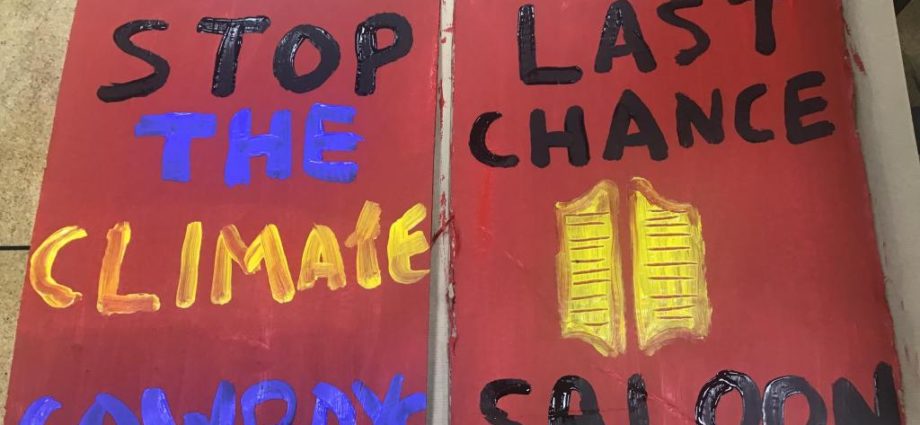
Since the UN’s 2018 special report on global warming (released when I was 13) gave humanity a climate crisis deadline, lowering emissions has become a priority of many governments around the world.
However, 12 years quickly turned into 11 years, which fell into 10 years with the distraction of a deadly pandemic. I am now 16 and we now have nine years before the effects of climate change are irreversible.
Humans tend to underestimate the passing of time, and 2030 is far enough away to push it out of our heads for the time being. It’s a bit like a group project due at the end of term, or the summer reading. But nine years is not a long time, especially with the colossal amount of damage we need to repair.
In 2030, I will be 25.
In 2030, I will have hopefully finished my studies, but if I decide to be a lawyer, I might be just starting bar school. I will certainly not be very far in my career or my entire life for that matter.
A common characterisation of my generation is a depressed, anxious, frustrated group of young people unafraid of the consequences of our actions. This, I think, is a textbook reaction to the apocalyptic future we can imagine, the future we want to have, and our hopelessness when given little power to change it. Everyone should be compassionate enough to want to preserve our planet for our future descendants, but we want to save it for ourselves.
My politics teacher explained to us today:
“Older people are desperate to return to the stability of the past, whereas younger people raised in a post 9/11 society have never known anything other than the chaos and realise we cannot go back.”
Climate crisis
The climate crisis is just one of the millions of problems that plague our modern society, and we are desperately trying to make something happen to stop us from slipping into a nihilistic misery. Climate justice also goes deeper that just switching to renewables, and is a systematic issue entrenched in our society for years. Nine years is looking shorter and shorter.
In the 1980s, before I was born, climate scientists warned companies and governments about the long-term effects of fossil fuels and greenhouse gases. These were promptly ignored in the interest of making money from said fossil fuels.
Once climate activism rose as I grew up, a swift manipulation of the terrified public allowed us to feel like we’re doing something without actually doing anything.
Are individuals the main problem for the climate crisis?
“Reduce! Reuse! Recycle!” I heard, assuming that individuals were the main problem instead of the multi-million-pound giant corporations making the unsustainable products we felt guilty for using.
Of course, reducing your waste as much as possible is something we should all aim to do. But it is not the systematic changes to the way we live, dictated by government and companies, that we need to save our planet. We want a world where all of our waste is biodegradable, and probably used for something better after its long life; where we don’t have as much waste in the first place due to the lack of packaging and overconsumption; where all energy is from natural sources that last us forever; and we live is cohesion with the natural ecosystems that we share the planet with. This is a sustainable world that will last us the ions we have. We need a climate revolution as such.
We need to do as much as we can in nine years.

Climate justice and inequality
Furthermore, climate justice is interlinked with social issues such as inequality. During the last 25 years of unprecedented emissions growth, the richest 1% of the world’s population were responsible for more than twice as much carbon pollution as the 3.1 billion people in the poorer half of the world. Despite this, the global south and most of the people who contribute the least, are hit the hardest by warming temperatures, unpredictable weather patterns and pollution. This drives further economic hardship, food insecurity and migration. With limited access to resources and strong infrastructure, they are vastly more vulnerable, yet the least responsible.
In addition, we have been given a chance to rebuild economies that prepare for our future after the pandemic. After our system broke down, it is time to invest in our planet. Governments across the world must make it a priority now to regulate the sustainability of products, systems, and corporations.
I am hopeful
I am 16 and I am hopeful. It is a not a lost cause: we have enough money and technology to halve emissions by 2030 and rescue our world; we have people like me and you demanding action every day and doing what they can; and most countries have signed the Paris Agreement and recognise the need for action. All we need now is commitment and a precedence for our environment and the people in it rather than money.
In nine years, I will be 25 and looking forward to my future.
You can find out about the rally for climate action in Newcastle on Saturday 18 September here.
Please follow us on social media, subscribe to our newsletter, and/or support us with a regular donation


